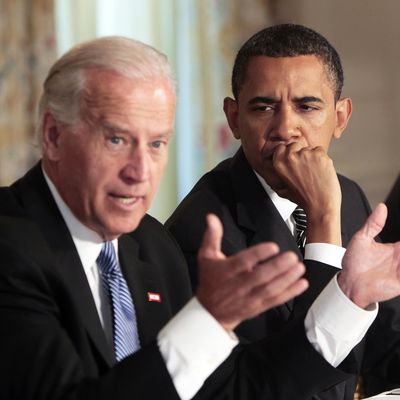
Both publicly and privately, one of Joe Biden’s major talking points for why he’s the pol best equipped to pull America out of its current crisis is that he and Barack Obama faced a lot of the same challenges upon taking office in 2009. And he’s right that the Great Recession is the recent national challenge that’s within shouting distance of the combined nightmare of a pandemic and an even Greater Recession.
It’s natural, moreover, that Biden wants to build on the crisis-management legacy of the president to whom he owes so very much — a man whose favorability ratings after his presidency ended have been much higher than Biden’s or Trump’s, and who has become a revered figure among Democrats.
But there’s a major problem with Biden winning the presidency and partying like it’s 2009: Obama’s record in dealing with that crisis was mixed at best, even though he had political assets that Biden will not enjoy (e.g., big majorities in both congressional chambers) and faced conditions that were bad but nothing like today’s. Worse yet, Obama’s veep shows signs of having learned little from the experience, counting on mobilizing public opinion to push Republicans into cooperating with him, as Obama also tried — and failed — to do.
The Obama-Biden crisis-management record had its moments. But the new administration’s two signal accomplishments, the 2009 stimulus package and the 2010 Affordable Care Act, were both marred by compromises with Republicans on the former and with moderate-to-conservative Democrats on the latter. Cap-and-trade legislation went nowhere in the Senate. The party’s crucial Senate supermajority was fumbled away in a clumsy special election in Massachusetts. The president’s efforts to mobilize public opinion to enact his agenda — a strategy that at the time I approvingly called “grassroots bipartisanship” — went nowhere. And the Obama-Biden team was rewarded for its crisis-management efforts with a public repudiation in the 2010 midterms so powerful that a decade later Democrats are still trying to dig their way out of the wreckage.
You could see how a Biden administration — particularly if Democrats don’t control both chambers of Congress, or even if they do and yet refuse to abolish the filibuster (which Biden doesn’t want to do in any event) — could face a headwind stronger than those Obama administration inherited in 2009. Certainly Republicans will remember 2010 and how it justified the total obstruction strategy the GOP adopted the moment Obama took office. 2022 could look exactly the same to them. Yes, many congressional Republicans have supported coronavirus stimulus spending at a level massively higher than what they fought in 2009. But you can bet your bottom dollar that with their party no longer controlling the White House, Republicans will pivot decisively to the same kind of anti-deficit and pro-tax-cut messaging they always adopt when Democrats are in charge.
Does Joe Biden have the rhetorical chops to overwhelm Republican opposition in a way that Obama could not? It’s unlikely. The New Republic’s Osita Nwanevu cites Biden’s expressed determination to reshape America like FDR did and sensibly notes that he “would have to unite an extraordinary proportion of the American public — not only in support of his agenda but in support of him, personally, as a political leader, just as Roosevelt did.” If, as some seem to expect, Biden will drift into power on the heels of Trump’s failures without much of a personal mandate, it’s unlikely he will be capable of some sort of legislative blitzkrieg upon taking office.
To be clear, some of the voters likely to support Biden at the polls in November will regard separating Trump from the presidency as a sufficient accomplishment. And even if his legislative strategy is as feckless as it often sounds, a President Biden can do a world of good via executive actions and appointments — particularly judicial appointments.
But if he wins and takes office in the midst of a continuing public-health and/or economic crisis, Biden really needs to show he learned something in 2009 and 2010. At a minimum, he needs to support radical procedural steps in Congress (including abolition of the filibuster) and executive actions (pushing his powers to the limit) to prevent Republicans from thwarting his agenda in toto. And he will need to find a voice that calls the country to challenges more inspiring if also more difficult than the status quo ante messaging he deployed in winning the Democratic nomination. It’s not going to be enough for Biden to get rid of the Bad Man and then rest on his laurels. He will likely need to do great things — greater than he and Barack Obama were able to do in their first term — in public-health and economic policy right away. Nothing in his long career is likely to prepare him entirely for that. And so he may need some presidential coup de main as miraculous as his rise from apparent death in the 2020 Democratic nominating contest. I’m sure Barack Obama can and will tell him that recapitulating 2009 won’t be enough.






























